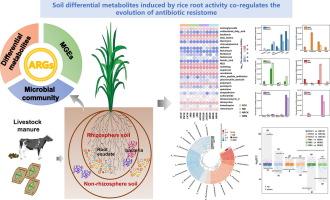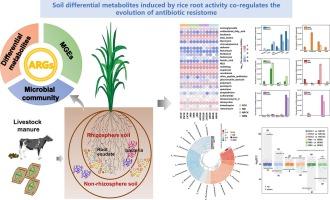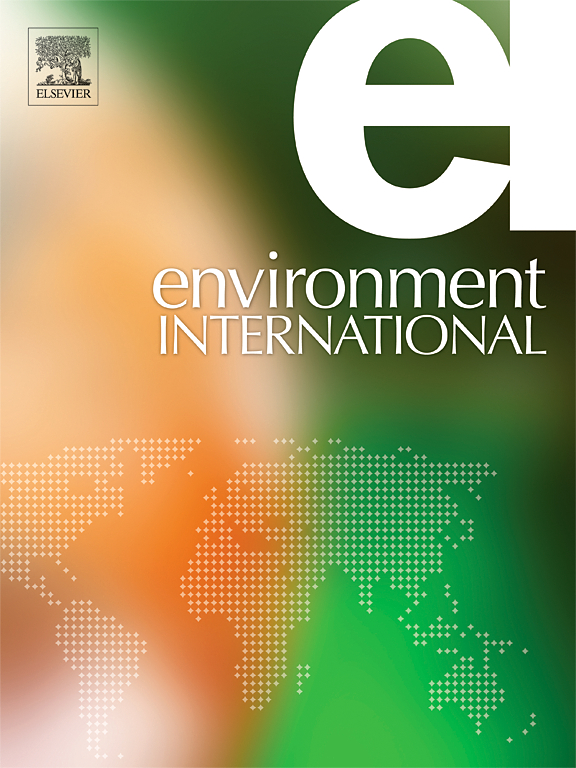Soil metabolic processes influenced by rice roots co-regulates the environmental evolution of antibiotic resistome
IF 10.3
1区 环境科学与生态学
Q1 ENVIRONMENTAL SCIENCES
引用次数: 0
Abstract
Plant root activities lead to significant differences in metabolites between the rhizosphere and non-rhizosphere soil, profoundly affecting microbial distribution. However, how this process drives the migration and propagation of manure-derived antibiotic resistance genes (ARGs) in farmland ecosystems remains unclear. Herein, we used a rice pot microcosm experiment to explore the characteristics of antibiotic resistome and bacterial communities in rhizosphere and non-rhizosphere soils and the driving effects of rhizosphere metabolites on ARG propagation. The results showed significant differences in some ARGs and bacterial diversity in rhizosphere and non-rhizosphere soils with varied differential ARGs between different growth stages of rice (P < 0.05). The biosynthesis of secondary metabolites and glutathione metabolism were found to be the main pathways affecting ARG differences in rhizosphere and non-rhizosphere soils under manure application. Structural equation modeling (SEM) analysis further indicated that ARG distribution differences between rhizosphere and non-rhizosphere soils were mainly regulated by differential metabolites, which influenced the ARG distribution by altering the succession of soil microbial communities. These results demonstrate the role of differential metabolites resulting from rice root activities in co-regulating ARG distribution, providing new insights into the regulatory mechanisms of soil ARG dynamics in paddy fields.


受水稻根系影响的土壤代谢过程共同调节抗生素抗性基因组的环境演化
植物根系活动会导致根圈土壤和非根圈土壤中代谢物的显著差异,从而对微生物的分布产生深远影响。然而,这一过程如何驱动粪便衍生的抗生素抗性基因(ARGs)在农田生态系统中迁移和传播仍不清楚。在此,我们利用水稻盆栽小宇宙实验,探讨了根圈土壤和非根圈土壤中抗生素抗性基因组和细菌群落的特征,以及根圈代谢物对 ARG 传播的驱动作用。结果表明,根圈土壤和非根圈土壤中的一些 ARGs 和细菌多样性存在显著差异,水稻不同生长阶段的 ARGs 差异也不同(P < 0.05)。次生代谢产物的生物合成和谷胱甘肽代谢是影响施肥条件下根圈土壤和非根圈土壤 ARG 差异的主要途径。结构方程建模(SEM)分析进一步表明,根圈土壤和非根圈土壤中 ARG 的分布差异主要受差异代谢物的调控,差异代谢物通过改变土壤微生物群落的演替影响 ARG 的分布。这些结果证明了水稻根系活动产生的不同代谢产物在共同调控 ARG 分布中的作用,为水稻田土壤 ARG 动态调控机制提供了新的见解。
本文章由计算机程序翻译,如有差异,请以英文原文为准。
求助全文
约1分钟内获得全文
求助全文
来源期刊

Environment International
环境科学-环境科学
CiteScore
21.90
自引率
3.40%
发文量
734
审稿时长
2.8 months
期刊介绍:
Environmental Health publishes manuscripts focusing on critical aspects of environmental and occupational medicine, including studies in toxicology and epidemiology, to illuminate the human health implications of exposure to environmental hazards. The journal adopts an open-access model and practices open peer review.
It caters to scientists and practitioners across all environmental science domains, directly or indirectly impacting human health and well-being. With a commitment to enhancing the prevention of environmentally-related health risks, Environmental Health serves as a public health journal for the community and scientists engaged in matters of public health significance concerning the environment.
 求助内容:
求助内容: 应助结果提醒方式:
应助结果提醒方式:


